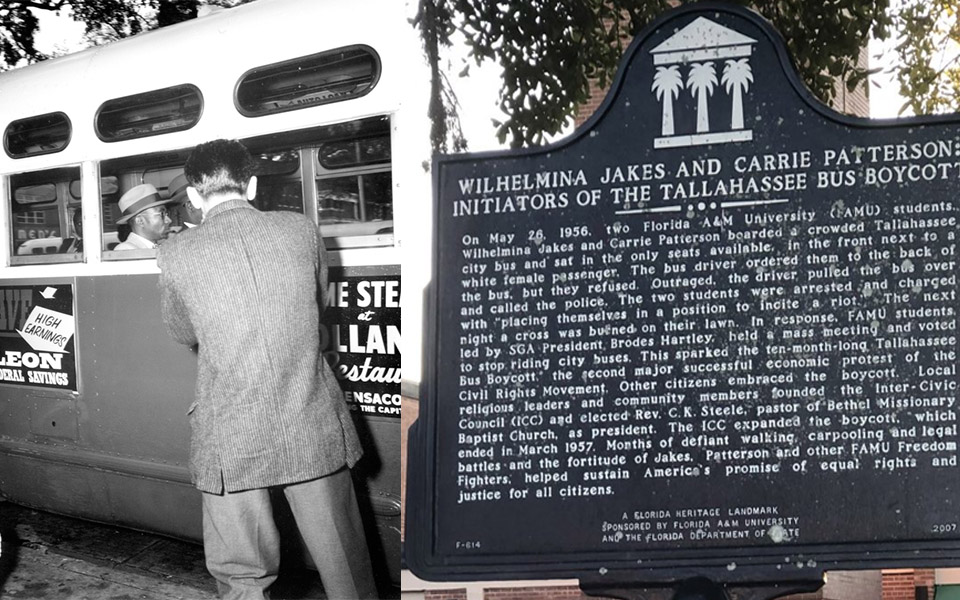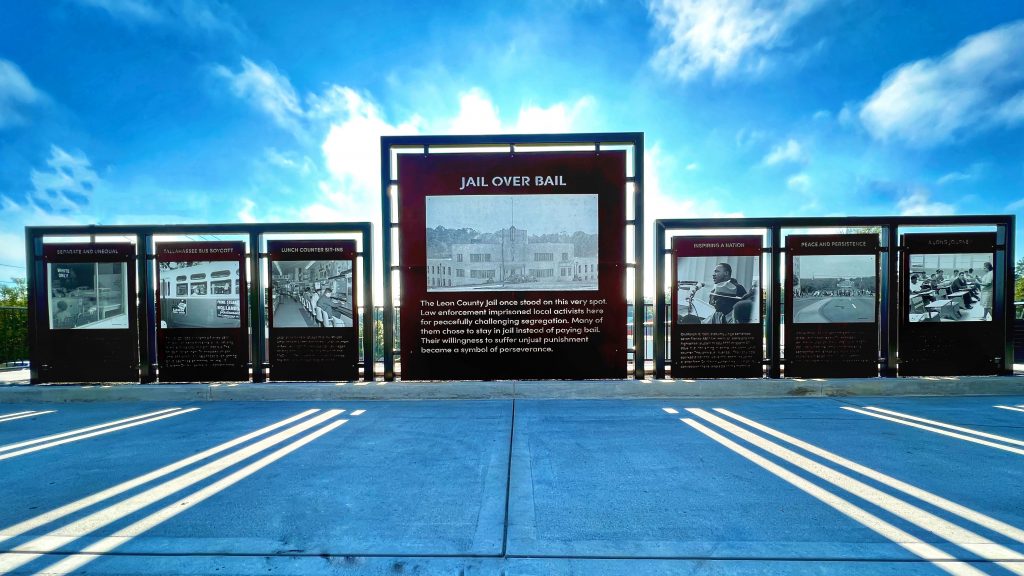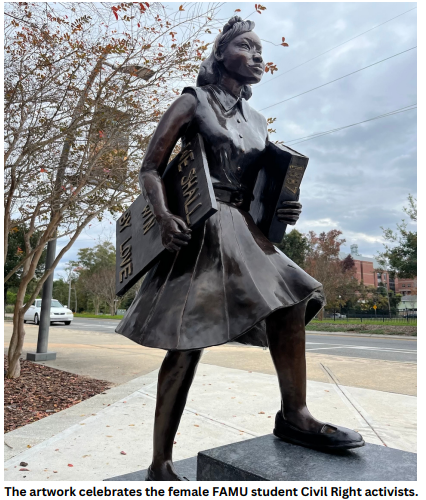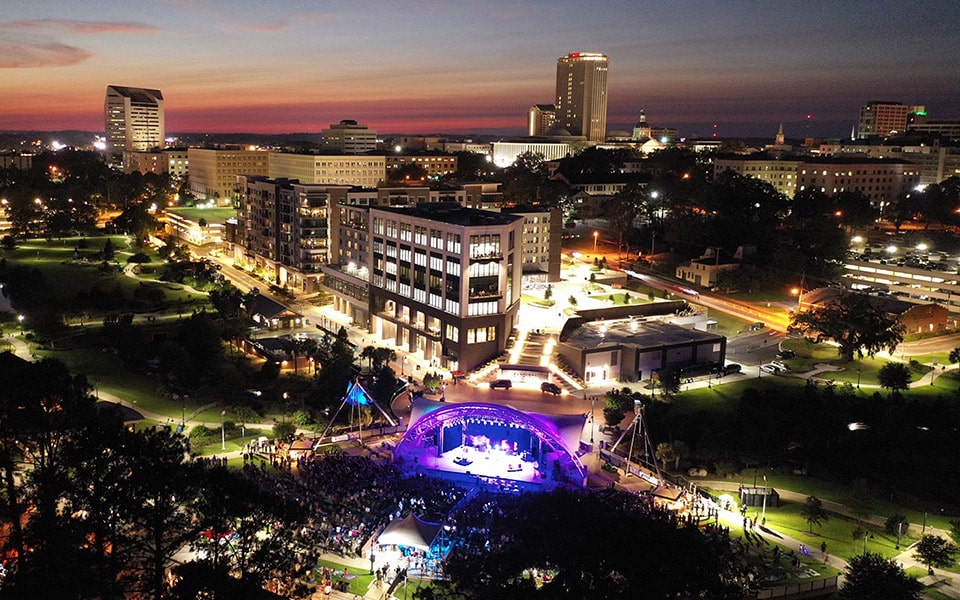
Honoring Our Past, Building Our Future
Throughout its history, Florida’s Capital City has been proudly shaped by the immense contributions and impacts of African American people and culture. This Black History Month – and all year long – celebrate the trailblazing individuals, movements, and historical sites; reminders that Black History is the history of the community.

From civil rights heroes like the Rev. C.K. Steele, Wilhelmina Jakes and Carrie Patterson, to black business leaders and entrepreneurs like George Proctor, a freed slave and builder responsible for some of Tallahassee’s most beloved homes, the fingerprints of black leaders can be found throughout Florida’s Capital City.
The John G. Riley House & Museum for African American History & Culture – a member of the National Register of Historic Places – elegantly stands in downtown Tallahassee and reminds us of the thriving African American neighborhood of Smokey Hollow, once stretching across present-day Cascades Park.

 Taking its place among some of the most influential cities in the fight for freedom and equality, Tallahassee is home to movements that accelerated progress for African Americans across the nation. From the first reading of the Emancipation Proclamation in Florida on the steps of the Knott House May 20, 1865, to the Tallahassee Bus Boycott led by students in 1956, Tallahassee has a proud tradition in the struggle for equal rights. In 1972, Tallahassee elected James R. Ford, the first African-American mayor of a U.S. state capital city.
Taking its place among some of the most influential cities in the fight for freedom and equality, Tallahassee is home to movements that accelerated progress for African Americans across the nation. From the first reading of the Emancipation Proclamation in Florida on the steps of the Knott House May 20, 1865, to the Tallahassee Bus Boycott led by students in 1956, Tallahassee has a proud tradition in the struggle for equal rights. In 1972, Tallahassee elected James R. Ford, the first African-American mayor of a U.S. state capital city.

Tallahassee Civil Rights Memorial
Located on the site of the former Leon County Jail now known as the Cascades Historical Plaza, the Tallahassee Civil Rights Memorial honors the courageous men and women who led the jail-in to protest segregation and interprets other key events of Tallahassee’s civil right history. A second smaller exhibit entitled “the Four Corners of History” shares the story of the Old City Waterworks Building, the Caroline Brevard Grammar School, the former Leon County Health Unit and the former jail site.

Sixty years since the passing of the Civil Rights Act, Tallahassee artist Alisha Lewis continues the work of these brave women with her creation of “For the Generations to Fulfill the Dream.” Located on FAMU Way, near the South Martin Luther King Jr. Blvd. roundabout, this life-size, bronze sculpture depicts a determined young woman holding a book in one arm and a protest poster under the other. The artwork pays homage to the female students of FAMU and the role they played in the fight against racial discrimination.

Black History in Tallahassee continues to unfold with new events celebrating black history and culture including the Harambee Festival, Frenchtown Rising, and Soul of the Southside that have become annual traditions for the entire community. More Black-owned businesses and restaurants are joining the local economy leading to an African American culture in Tallahassee that has never been stronger.

For some history happening in real time, visit some of the black-owned businesses and experiences below.
The Fuzzy Pineapple
Founded in 2011 by Nefetari (Nef) Dennard at the early age of 16, The Fuzzy Pineapple, located on S. Adams St. is a local art, apparel, and accessory company specializing in handmade and customized artwork. Co-owned by her sister, Nzinga (Zing), the pair contribute their own designs and work while also splitting the various business duties.
Olean’s Café
For over 20 years, Olean’s Café has proudly served Southern cooking from the soul. The café is located directly across from FAMU’s campus and has been a staple for Rattlers and southern food lovers alike. Olean McCaskill owns and operates the café, and on most days can be seen working behind the counter. The walls are covered in photos of her family, the community, and FAMU legends. When looking for soul food with heart, Olean’s is the place to go!
Frenchtown Walking Trail – Soul Voices
Introduced by the John G. Riley House, Soul Voices of Frenchtown features nine markers with audio components of the voices of its prominent residents both living and deceased telling the story of Frenchtown, one of Tallahassee’s oldest African American communities. Through these voices, visitors will discover, learn and celebrate a time when Frenchtown was a thriving, self-sustaining community of families, homes, businesses and pride – a time when Frenchtown had it all.

Florida A&M University
Established in 1887, Florida Agricultural and Mechanical University (FAMU) was founded as the State Normal College for Colored Students. Today, as one of 103 historically Black colleges and universities (HBCU’s) in the nation FAMU remains the only HBCU in Florida’s 12-member state university system. The first president, Thomas DeSaille Tucker and legislator Thomas Van Renssaler Gibbs, guided the school’s beginning including its move from Copeland Street to its present location on the most prominent hill in Tallahassee. FAMU offers 97 degree programs and has an enrollment of more than 10,000 students.
The Meek-Eaton Southeastern Regional Black Archives and Research Center
In 1971, the Florida Legislature mandated the creation of a repository to “serve the state by collecting and preserving source material on and about African Americans from ancient to present times.” This mandate gave birth to what would later become the Black Archives Research Center and Museum. The center was founded in 1976 by Florida A&M University history professor, Dr. James N. Eaton. It officially opened in historic Carnegie Library on FAMU’s campus. Since that time, the Black Archives has served as a research center for individuals of various ages, ethnicities and interests.

Tallahassee-Leon County Civil Rights Sidewalk
Located downtown on the corner of Monroe and Jefferson Streets, the Tallahassee-Leon County Civil Rights Sidewalk tells the story of the city’s 1956 bus boycott and the lunch counter sit-in demonstrations of 1960-1963. Located on corner of East Jefferson Street and Monroe Street, the sidewalk has 16 terrazzo panels and includes the names of local Civil Rights leaders and other activists who participated in the protests.
Rev. C.K. Steele Statue and Rosa Parks Marker
The Reverend C.K. Steele (1914-1980) was the most recognizable figure in the Tallahassee Civil Rights movement of the 1950s and 1960s and the city’s bus terminal located at 111 W. Tennessee St. was named in his honor. The former pastor of Bethel Missionary Baptist Church marched with Martin Luther King Jr. and was a founding member of the Southern Leadership Conference. Many meetings associated with the Tallahassee bus boycott were held at his church which made it a frequent target of Ku Klux Klan activities.
Other notable African American heritage sites include:
- Battle of Natural Bridge Historic State Park, where two regiments of U.S. Colored Troops among Union forces fought against the Confederates
- First Presbyterian Church, built in 1838, this prominent Classic Revival style building still has its original gallery set aside for slaves who were members of the church but sat apart from their masters.
- Old City Cemetery, Tallahassee’s first public cemetery served as the burial place for both African Americans and whites as early as 1829. Laws at the time required African Americans be buried in the western half of the cemetery. After 1937 most African Americans were buried in Greenwood Cemetery.
- Rutgers House, commemorating the extraordinary lives of Antonio, George and John Proctor — free black men in 18th- and 19th-century Tallahassee.
- Tallahassee Museum, offers various historic structures including the Bethel Missionary Baptist Church, the state’s first organized Black church.
- Taylor House Museum, historic home of Lewis W. Taylor and a museum of African American history, culture and civil rights.


